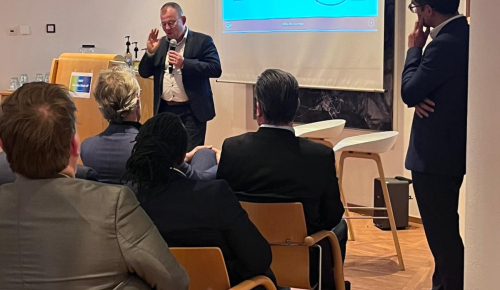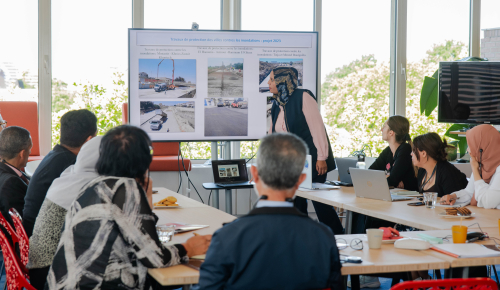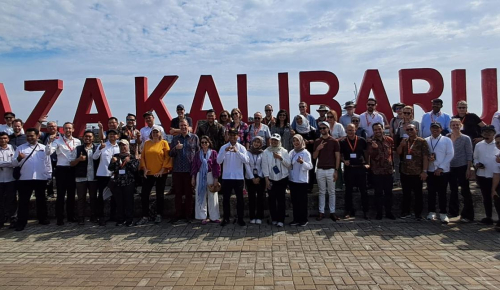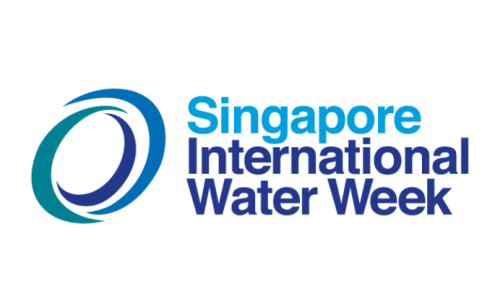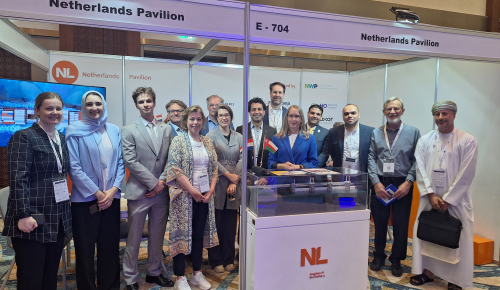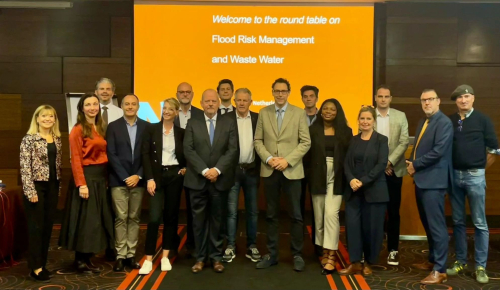Blog
23 June 2017Blog: Shorter showers: a workable initiative for resilient cities
The topic of “resilient cities” is not simply a matter of developing policy and making plans: it’s also about taking real, concrete action. One example of an organisation that is doing just that, in cooperation with Wageningen University, the Sapienza University in Rome and the Swiss start-up Amphiro, is The Student Hotel, which is attaching meters to its showers shower to display their water and electricity usage. They expect to see a 20% reduction in water use. The initiative was presented this week during the water mission to Italy.
Concept
Frank Uffen, Director of Partnerships at The Student Hotel, writes in his blog about the initiative and about the mission. "We had already been working on the initiative for some time. The mission, including the topic of 'water and resilient cities' was a fantastic opportunity to present the initiative publicly. The concept itself is fairly simple: people aren’t really aware of how much water they consume while they’re taking a shower. The meter we attach to the shower hose shows them real-time data on how much they’re using. Studies have shown that this causes people to take shorter showers.
The current generation of students has a positive attitude towards the environment: they really want to contribute to conservation, but they have to be offered the opportunity to do that, and that’s where we come in. It’s really interesting to see that, although of course you need technology, the biggest determining factor in achieving sustainable water usage is people’s behaviour. And that’s the factor that is hardest to influence. Our solution is a combination of technology and influencing behaviour."
Immediate result
"The concept has had a very positive reception, especially here in Italy, precisely because it delivers an immediate result. In many Italian cities, climate change resilience is a very current topic. Water use is increasing, which is especially a concern for sectors such as tourism. We will be installing the meters in all our new branches, including those in Italy. It’s a good fit for our philosophy. Together with our partners, we want to create a 'living lab' where we can work on innovative, sustainable, scalable answers to the challenges faced by cities both today and in the future."
Opportunities
"The mission’s matchmaking offered us an opportunity to speak to all kinds of people we wouldn’t normally come into contact with, both Dutch people and Italians. Edyta and Mark from NWP made sure we met a great many interesting contacts. For example, I was able to talk to someone from the Dutch fashion industry – another of the economic mission’s themes – and that person is in a position to offer me an introduction to the leading fashion fair in Florence. This autumn we’ll be opening our first Italian hotel right next door to that fair. It was also great to have more time to talk to our Dutch partners, to get to know each other better. I had a fantastic conversation with Arnoud Molenaar, Rotterdam’s Chief Resilience Officer, who told me: 'I’m impressed with the potential of The Student Hotel research lab concept for cities! It’s not only the platform for experimentation that makes TSH relevant to the water and climate issue, it also has a role to play in retaining talent and attracting the new generation. This integrated approach is reinforcing urban resilience!' We are going to look into the possibilities for joining forces to develop concrete new initiatives. And, of course, we were able to strengthen our Italian network even more. That’s important, because Italy is the second country we are starting business in, after the Netherlands. We’re beginning in Florence, then adding Bologna in 2018, and Rome and a second location in Florence in 2019. By 2021 we expect to have between eight and ten locations, all with the same philosophy, including our commitment to sustainability and climate resilience. Milan is also high on our list, so it was a brilliant opportunity when King Willem-Alexander of the Netherlands personally introduced us to the mayor, Giuseppe Sala. Milan is working hard to redevelop its old city districts, and our plans are a great fit for that project."
Join forces
"Our locations allow us to build a network of open urban campuses across Europe; we really value the link with other university cities. This week I made a proposal to join forces to organise summer schools in the Netherlands and Italy, centered around resilient cities. The courses will be aimed at students, but they will also be open to young professionals from the public and private sector. We have a lot to learn from each other, and we want to help create the necessary infrastructure to make that possible."
The mission
The cross-sector approach to water challenges was at the heart of this week’s economic mission to Rome and Milan, which included water among its key topics. The mission was led by Minister Liliane Ploumen. In cooperation with RVO.nl, the Dutch embassy in Rome and the Consulate-General in Milan, the NWP was responsible for the organisation and content of the water mission.
In the same week, King Willem-Alexander and Queen Máxima paid a state visit to Italy, and the separate programmes of the state visit and the water mission had a certain amount of overlap.
For more information about opportunities and possibilities in Italy, please contact Edyta Wisniewska and/or Mark Niesten.


